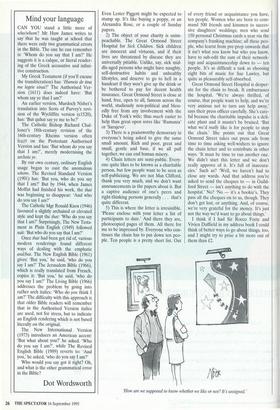Mind your language
CAN YOU stand a little more of who/whom? Mr Huw James writes to say that he was taught at school that there were only two grammatical errors in the Bible. The one he can remember is: 'Whom do you say that I am?' He suggests it is a calque, or literal render- ing of the Greek accusative and infini- tive construction.
My Greek Testament (if you'll excuse the transliteration) has: 'Humeis de tina me legete einai?' The Authorised Ver- sion (1611) does indeed have: 'But whom say ye that I am?'
An earlier version, Murdoch Nisbet's translation into Scots of Purvey's revi- sion of the Wycliffite version (c1520), has,: 'But quhat say ye me to be?'
The Catholic Bishop Richard Chal- loner's 18th-century revision of the 16th-century Rheims version often leant on the Protestant Authorised Version and has: 'But whom do you say that I am?', merely modernising the archaic ye.
By our own century, ordinary English usage began to oust the anomalous whom. The Revised Standard Version (1901) has: 'But you, who do you say that I am?' But by 1944, when James Moffat had finished his work, the that was beginning to disappear: 'And who do you say I am?'
The Catholic Mgr Ronald Knox (1946) favoured a slightly archaised or elevated style and kept the that: 'Who do you say that I am?' Surprisingly, The New Testa- ment in Plain English (1949) followed suit: 'But who do you say that I am?'
Once that had been got rid of, various modern renderings found different ways of dealing with the emphatic and/but. The New English Bible (1961) gives: 'But you,' he said, 'who do you say I am?' The Jerusalem Bible (1966), which is really translated from French, copies it: 'But you,' he said, 'who do you say I am?' The Living Bible (1966) addresses the problem by going into rather arch italics: 'Who do you think I am?' The difficulty with this approach is that older Bible readers will remember that in the Authorised Version italics are used, not for stress, but to indicate an English rendering which is not based literally on the original.
The New International Version (1973) introduces an American accent: 'But what about you?' he asked. 'Who do you say I am?', while The Revised English Bible (1989) reverts to: 'And you,' he asked, 'who do you say I am?'
Who would you say got it right? Oh, and what is the other grammatical error in the Bible?
Dot Wordsworth


































































 Previous page
Previous page